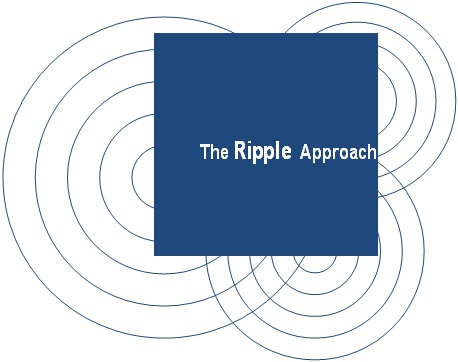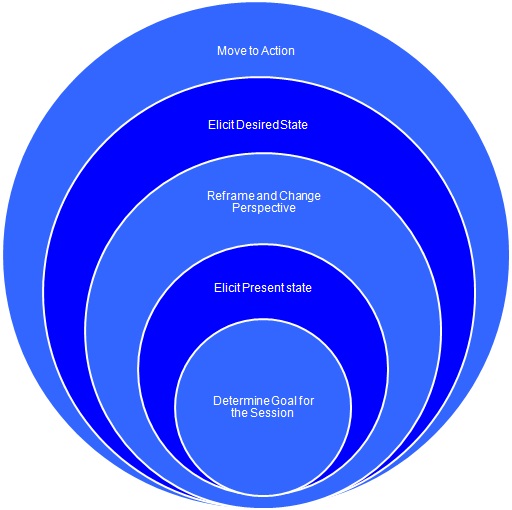A Coaching Model Created by John Eustace
(Executive Coach, UK)
The Ripple Approach is based on the concept of the ever-widening impact a shift to a positive mind-set can have on a client and other people in their lives. Below is an explanation of the model and sample questions that could be asked.
In the session, it is important for the coach to ask incisive questions, listen actively and ‘go with the flow’.
The Ripple Approach Model
 Determine Goal for the Session
Determine Goal for the Session
 Once the coach/client relationship has been established, the focus moves to the framework of the session and to what the client wants to achieve.
Once the coach/client relationship has been established, the focus moves to the framework of the session and to what the client wants to achieve.
It is important the goal is owned by the client and is within their control:
- What do you want to achieve in this session?
- How can I support you today?
- What would be most helpful for you to take away?
Elicit the Present State
Once the goal is clear, the coach would then ask questions to understand where the client is now (the Present State) and help the client develop a deeper level of self-awareness:
- What is the challenge/issue, specifically?
- How do you know this is the case?
- How does this impact yourself and others?
Reframe and Change Perspective
When the client is clear on the issue it is time to challenge those assumptions and help them reframe:
- What are you assuming that is stopping you achieving your goal?
- What are the positive opposite words/phrases of your assumptions? (The coach will ask the client to make a sentence using the positive assumptions – new empowering language)
- Using the new sentence, what ideas do you have to move forward? (Continue to ask the client for more until the list is exhausted… what else?)
- Which ideas are the most relevant in achieving your goal?
Elicit the Desired State
This stage is to help the client envision the path to their goal (including potential road blocks and help required) and what will be different when they have reached their goal:
- How will you know when you have achieved your goal?
- What will you see, hear, and feel?
- How will this affect your life, family, business or job, friends?
- What obstacles may prevent you from achieving your goal?
- What support will you need?
Move to Action and Assess Commitment
Allow the client time to reflect on the main take-aways of the session and agree action points.
- What are you going to do?
- When are you going to do it?
- Rate on a scale of 1-10 how willing you are to move forward on action – what prevents it from being a 10?
Reference Material
Time to Think – Nancy Kline
Coaching for Performance – John Whitmore
ICA Advanced Coaching Programme